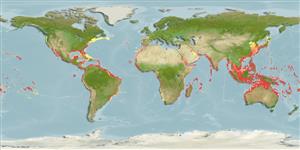Preferred temperature (Ref.
115969): 20 - 29.2, mean 27.9 (based on 6848 cells).
Phylogenetic diversity index (Ref.
82804): PD
50 = 0.7500 [Uniqueness, from 0.5 = low to 2.0 = high].
Bayesian length-weight: a=0.01349 (0.01201 - 0.01516), b=2.98 (2.95 - 3.01), in cm Total Length, based on LWR estimates for this species (Ref.
93245).
ຊັ້ນເຂດຮ້ອນ (Ref.
69278): 3.8 ±0.2 se; based on diet studies.
ຄວາມຢືດຢຸ່ນ (Ref.
120179): ສູງ, ປະຊາກອນຕຳ່ສຸດທີ່ໃຊ້ເວລາສອງໜ້ອຍກວ່າ 15 ເດືອນ (K=0.6-0.9).
Prior r = 1.19, 95% CL = 0.79 - 1.79, Based on 8 data-limited stock assessments.
Fishing Vulnerability (Ref.
59153): Low vulnerability (25 of 100).
Climate Vulnerability (Ref.
125649): High vulnerability (60 of 100).
